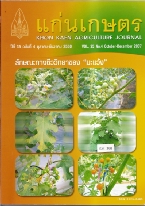Role of Microorganisms, Soluble N and C Compounds in Fermented Bio-extract on Microbial Biomass C, N and Cowpea Growth
Main Article Content
Abstract
Previous field and pot experiments showed that the sole application of the bio-extract did not increase plant dry weight and yield. However, application of bio-extract (BE) with organic fertilizers increased plant dry weight (leaf, stem and yield). It has been hypothesized that the bio-extract may act as a direct source of beneficial microorganisms or/and substrates to stimulate soil microbial activities in decomposing organic fertilizer and to release nutrients to plants.The objectives of this pot experiments were to investigate the roles of live microorganisms and/or chemical constituents of bio-extract combined with or without compost on microbial biomass and crop growth. Autoclave treatment on the bio-extract showed that the living microorganisms contained in the bio-extract were not significant source of microorganisms responsible for decomposing organic fertilizer in the soil. There were no significant differences in microbial C and N in the soils treated with either original or autoclaved bio-extracts in the short term (8 days). Bio-extract after autoclaving could still enhance crop growth (top dry weight) when being combined with municipal compost. Moreover, cowpea treated with original, autoclaved or artificial (only soluble C and N) bio-extracts did not show significant difference in top dry weight. Our studies suggest that some substrates, such as soluble organic acids, amino acids, in the bio-extract might play some important roles to stimulate soil microbial activities and enhance crop growth.


